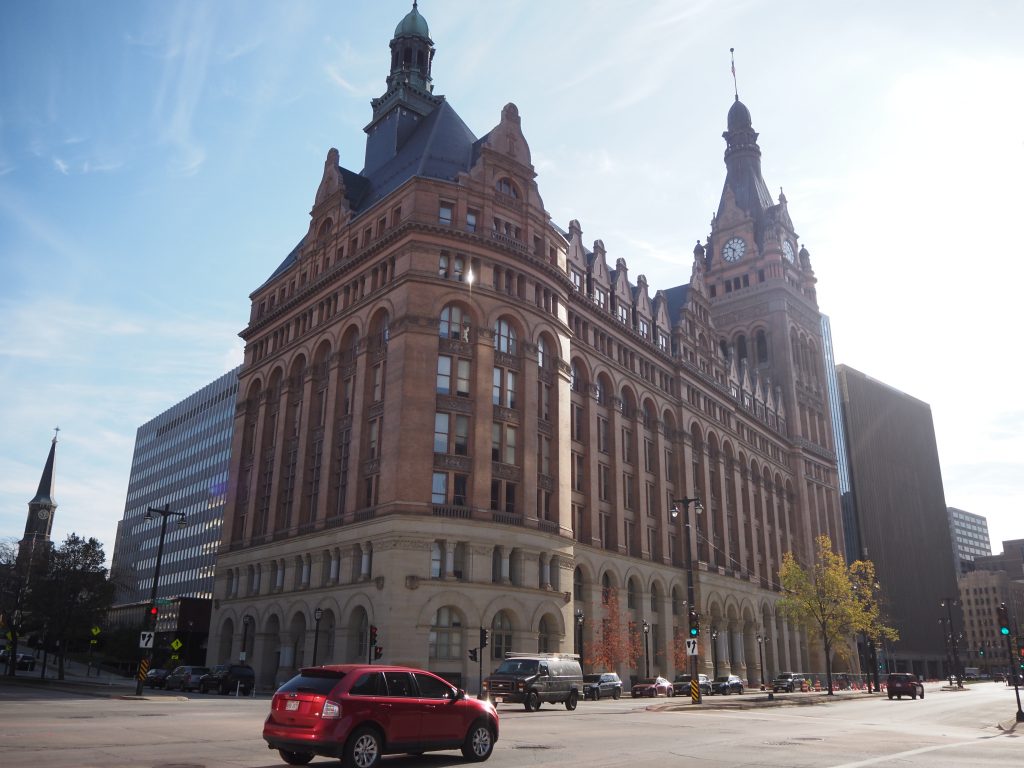Advocates Push for City-Owned Public Utility
Replacing We Energies would lead to lower rates and fewer power outages, they declare.
Progressive groups in Milwaukee are pushing for the city to create its own municipal utility, a move they say will lead to lower rates and fewer power outages as utility bills continue to rise for many Wisconsin residents.
We Energies, the utility company providing service to the majority of southeast Wisconsin, increased their rates for residential customers by 11 percent this year. Under that rate increase, customers are paying around $11 to $12 more on their electric bill each month.
In response, the Power to the People campaign delivered nearly 2,000 signatures on a petition calling for Milwaukee to create its own publicly-owned energy utility.
“The goal behind it is to simply allow the working class folks of Milwaukee to have control of the utilities that they’re forced to use, the things that keep them alive frankly,” said Greg Brown, chair of the campaign.
Municipal utilities have lower rates than other types of electric utilities, according to the American Public Power Association. An Energy Information Administration study also found that “municipal utility customers experienced the lowest instances of power outages in both frequency and duration.”
Groups in the campaign — which include Milwaukee Democratic Socialists of America, the Greater Milwaukee Green Party, North Side Rising, Our Wisconsin Revolution and the Milwaukee Party for Socialism and Liberation — also said a municipal utility in Milwaukee would place more of an emphasis on clean and renewable energy sources.
“The real thing that we’re building … is to build the mass movement of regular working class people that’s going to be able to stand up to We Energies and say, ‘No, we’re sick of shareholders calling the shots in this economy, and we want regular people, democratically, to be able to make the decisions,'” said Alex Brower, the co-chair of Milwaukee Democratic Socialists of America. “That’s one of the advantages that people are going to be enjoying is the fact that we will be able to be in the driver’s seat for how energy looks in Wisconsin.”
Milwaukee Alder Bob Bauman, chair of the Milwaukee Public Transportation Review Board, said the board will likely invite the group to make their case to the board soon.
“I think it is a worthwhile conversation to explore what options exist in the area of essentially converting utility to a publicly-owned entity,” Bauman said.
Even so, he said he expects there to be legal and financial challenges ahead if the city did consider making the move.
Tom Content, executive director of Wisconsin’s Citizens Utility Board, also said it could be a challenge, but he understands why residents are calling for it.
“It does underscore that people are concerned about rising costs and the fact that the rates have gone up so significantly,” Content said.
In a statement, Brendan Conway, a spokesperson for We Energies, said energy rates for Milwaukee are below the national average. He also said the company has experienced crews to help with storm response and a “depth of technical expertise.”
“This has resulted in customer savings and reliability that has been recognized by industry experts across the country,” Conway said.
Conway said the company is also “aggressively supporting the climate goals of the city and state.”
“Our plans to close older, less-efficient fossil fuel plants and build new clean energy is expected to save our customers nearly $2 billion over the next 20 years,” Conway said in the statement.
Wisconsin law does outline the process for a city to move away from a private utility company. That includes a referendum from voters regarding the change and a decision from the Public Service Commission of Wisconsin to evaluate pricing and infrastructure.
Manitowoc, Shawano, Oconomowoc, Cedarburg and Hartford have public-owned utilities. Manitowoc Public Utilities has operated in Manitowoc for over 100 years and is one of more than 2,000 public power utilities in the nation. Larger cities that have municipal utilities include Los Angeles, Nashville and Seattle.
Meanwhile, Alliant Energy, Xcel Energy and Madison Gas and Electric have submitted proposals to the Public Service Commission to increase rates in 2024.
Although they haven’t filed applications yet, WEC Energy Group‘s utilities — We Energies and Wisconsin Public Service — are also expected to propose rate increases later this year, according to Content.
Editor’s note: The Citizens Utility Board of Wisconsin and Alliant Energy are underwriters of Wisconsin Public Radio.
Listen to the WPR report here.
Milwaukee groups pushing for municipal utility to replace We Energies was originally published by Wisconsin Public Radio.
Political Contributions Tracker
Displaying political contributions between people mentioned in this story. Learn more.






















I presume a good share of the initial power will
be imported from the grid through WE Energies
infrastructure.
Such an arrangement would preserve
the advantages of WE’s existing skilled staff,
infrastructure, technical & repair familiarity, institutional
and procedural knowledge, billing infrastructure etc.
It would be great to see Milwaukee phase in
new capacity with its own decentralized, scalable
and safe THORIUM power in reusable modules.
Our added generating capacity baseline within their
service area would take some pressure off of WE energies
when use is high, and during their general conversion
to renewable sources.
This generating arrangement could also be key to
simplified accounting and billing, with a price
for the power generated factored into a discount
for home and business users inside the city limits.
If this proves too cumbersome on a monthly basis,
it could apply to a quarterly
or other adjustment.
In the future, participation could be expanded
to or copied by other communities.
If things ever got ugly between Milwaukee and
WE energies, we could sell power through the grid,
and distribute the revenue through some
uniform user location based structure.
While this is certainly an idea that deserves further exploration, I’d anticipate the usual struggle to erupt between conservatives billionaires, who will label the effort a “communist plot”, and a sensible citizenry who simply want to eliminate
those unnecessarily profiting from the delivery of a vital service.
It would seem wise to place a referendum on the ballot as soon as possible in order to short circuit the inevitable disinformation efforts that would be funded by the WMC, Bradley Foundation, Dick and Liz Uihlein, John Menards and Diane Hendricks.
Too bad a new utility would do zero for getting us off NG/coal. We’d still be beholden to buy the same dirty energy from the same crappy grid.